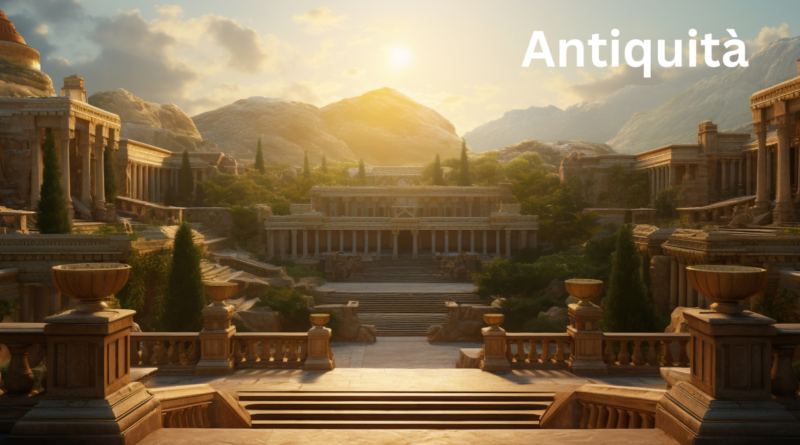Antiquità, or antiquity in English, refers to the ancient past, particularly the civilizations that flourished from the dawn of recorded history to the early Middle Ages. This era encompasses a wide array of cultures, including the Egyptians, Greeks, Romans, and various other societies across the globe. The term not only highlights the time frame but also signifies the art, architecture, philosophy, and technological advancements that emerged during these periods.
The Significance of Antiquity
- Cultural Heritage: Antiquità represents the roots of modern civilization. The philosophies and political systems developed during this time laid the groundwork for contemporary society. For instance, concepts of democracy from Ancient Greece and Roman law continue to influence modern governance.
- Art and Architecture: The artistic achievements of antiquity are unparalleled. The Pyramids of Giza, the Parthenon, and the Colosseum are monumental structures that reflect the ingenuity and aesthetic sensibilities of their respective cultures. Sculptures like Michelangelo’s David draw inspiration from ancient ideals of beauty and proportion.
- Literature and Philosophy: Ancient texts, including the works of Homer, Plato, and Virgil, are foundational to Western literature and philosophy. These texts explore themes of morality, existence, and the human condition, providing insights that remain relevant today.
- Scientific Advancements: The ancient world made significant strides in various fields, including mathematics, astronomy, and medicine. The Greeks laid the groundwork for geometry, while Roman engineers innovated in architecture and infrastructure.
The Legacy of Antiquity
The study of antiquity offers invaluable lessons in human achievement, resilience, and the complexities of societal development. Understanding ancient civilizations enables us to appreciate the progress made over millennia and the cultural diversity that has shaped the modern world.
- Archaeology and Preservation: Archaeologists play a crucial role in uncovering and preserving artifacts from antiquity. Their work allows us to piece together the past, providing context and understanding of ancient cultures.
- Museums and Education: Institutions like the British Museum and the Louvre house extensive collections of ancient artifacts, fostering a greater appreciation for our shared history. Educational programs help disseminate knowledge about these civilizations, encouraging further exploration and understanding.
- Modern Influence: The themes and ideas from antiquity continue to resonate in modern art, literature, and philosophy. Artists and thinkers often draw on ancient motifs, demonstrating that the past remains a vital source of inspiration.
Conclusion
Antiquità is not merely a historical period but a vital part of our collective identity. It reminds us of the enduring human spirit and the continuous pursuit of knowledge, beauty, and understanding. By exploring and appreciating our ancient heritage, we gain insights into our own lives and the world around us. Whether through literature, art, or archaeological discovery, the legacy of antiquity continues to shape our present and future.
FAQs
1. What is antiquità?
Antiquità refers to the ancient past, particularly the civilizations that existed from the dawn of recorded history to the early Middle Ages. This includes notable cultures such as the Egyptians, Greeks, and Romans, and encompasses their art, architecture, philosophy, and technological advancements.
2. Why is antiquity significant?
Antiquity is significant because it laid the foundation for modern civilization. The political systems, philosophical ideas, and cultural practices developed during this time continue to influence contemporary society. Moreover, the art and architecture from antiquity remain benchmarks of human creativity and innovation.
3. What are some major achievements of ancient civilizations?
Ancient civilizations achieved remarkable milestones in various fields, including:
- Art and Architecture: Construction of iconic structures like the Pyramids of Giza and the Parthenon.
- Philosophy and Literature: Works by philosophers such as Plato and Aristotle, and epic poems like Homer’s Iliad and Odyssey.
- Science and Mathematics: Development of geometry and advancements in astronomy and medicine.
4. How do archaeologists study antiquity?
Archaeologists study antiquity by excavating ancient sites, analyzing artifacts, and interpreting findings to reconstruct past societies. They use various techniques, including carbon dating, to determine the age of artifacts and gather information about historical contexts.
5. What role do museums play in preserving antiquity?
Museums are crucial for preserving antiquity as they house and protect artifacts from ancient civilizations. They provide educational resources and exhibitions that foster appreciation for our shared history and promote research in archaeology and history.
6. How has antiquity influenced modern culture?
Antiquity has profoundly influenced modern culture through literature, art, and philosophy. Many contemporary works draw inspiration from ancient themes, ideas, and aesthetics, showcasing the enduring relevance of these ancient civilizations.
7. What are some famous ancient texts?
Some notable ancient texts include:
- The Epic of Gilgamesh: An ancient Mesopotamian poem.
- Homer’s Iliad and Odyssey: Epic poems from ancient Greece.
- Plato’s Dialogues: Philosophical texts discussing ethics, politics, and knowledge.
- Virgil’s Aeneid: A Latin epic poem that tells the story of Aeneas.
8. How can I learn more about antiquity?
To learn more about antiquity, consider visiting museums, reading books on ancient history, or taking online courses. Additionally, many universities offer programs in archaeology and ancient studies that provide in-depth knowledge.
9. Are there any modern-day events or practices that trace their roots back to antiquity?
Yes, many modern-day practices, such as democratic governance, legal systems, and certain philosophical concepts, have roots in antiquity. Additionally, art forms, architectural styles, and literary themes continue to be inspired by ancient civilizations.
10. What are some key archaeological sites related to antiquity?
Some key archaeological sites include:
- The Pyramids of Giza in Egypt.
- Pompeii in Italy, preserved by volcanic ash.
- The Acropolis in Athens, Greece.
- Stonehenge in the UK, a prehistoric monument.











